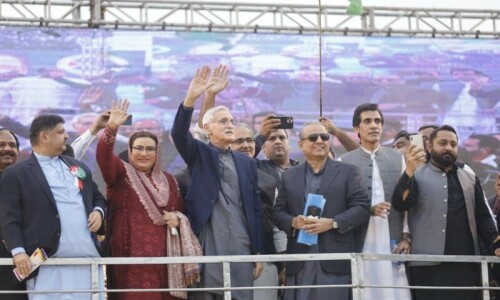Amid increasing diversity of views within their own ranks and emerging differences among allies, there are initial indications that political polarisation amidst rivals is losing much of its heat owing to changing realities.
Probably, the country’s political leadership is fully aware of the enormous challenges facing the next elected government, more so in the case of a split mandate. The dissatisfied masses hit by high inflation and surging cost of living may pose risks to the political capital of those coming into power. They also face the quest of the middle class and youth for a better future. And the country’s major problems cannot be resolved by unstable hybrid arrangements.
The Special Investment Facility Council (SIFC) has failed to develop mechanisms to mobilise domestic resources toward the productive sector, according to a recent report by the Policy Research Institute of Market Economy (PRIME).
If local investors are unwilling to invest in the country, it says, foreign investors will be hesitant to commit capital unless guaranteed abnormal profits, which is unsustainable in the long term. The exclusive focus on foreign investment by SIFC is a cause for concern and may not yield the desired results.
The report notes that the government has largely neglected vital institutional reforms and regulatory issues in its bid to attract foreign investment and address the balance of payments crisis. It also referred to shortcomings in attracting foreign investment in the challenging domestic economic and political environment.
In the current scenario, the hybrid regime has strengthened, stifling the natural growth of representative democracy
In the absence of a political reconciliation process, polarisation has strengthened hybrid democracy and stifled the natural growth of representative/participatory democracy. The common concern of the two leading parties, PTI and PPP, is whether the elections would be held as stipulated and whether the polls would be free and fair. They feel strongly that the pre-poll even-playing field is being denied to them.
PTI has also reportedly decided to approach liked-minded parties —particularly the PPP — in its struggle for a level playing field and transparent elections.
Deviating from its rigid instance, a PTI delegation called on JUI-F chief Maulana Fazlur Rehman, which was seen as a significant development by many. However, leaders of both parties termed the meeting ‘as a non-political event.’
Istehkam Pakistan Party (IPP) says, “We do not view opposition parties as enemies. They are fellow Pakistanis.”
The exclusive focus on foreign investment by SIFC is a cause for concern and may not yield the desired results
“Our leadership should have learnt by now that to bring changes and turn things around, they need to take a reconciliatory and cooperative approach,” says retired lieutenant general and former federal secretary Talat Masood. He sees ‘indications of that shift in Nawaz Sharif’s recent public address’.
PML-N leader Nawaz Sharif has called for harmony among all constitutional institutions and political players for the betterment of the country. The PML-N plans to renew its contracts with the allies in its previous coalition government, particularly the PPP.
The PML-N has also set up a committee under Senator Irfan Siddiqui to prepare ‘a new election manifesto in line with the changing times’. The committee will focus on the judicial system and the economy. It appears that the political issues are not on its prioritised agenda.
To overcome divisive political trends, the primary task of all political parties is to forge a minimum common agenda for resolving prioritised issues and allow the elected government to complete its electoral mandate to help end political and economic instability.
Major political parties are also facing challenges from local and regional parties, trying to attract voters from the urban lower and middle classes in relatively developed provinces of Sindh and Punjab.
MQM-P Convenor Dr Khalid Maqbool Siddiqui says his party does not want the division of Sindh. “We want to bridge the gulf between urban and rural areas,” he says. The MQM-P is against what he described as a ‘feudal democracy.’ This political gulf is also a significant hurdle against rural industrialisation and the economic integration of the province.
The Urdu-speaking Sindhis (a cultural minority) should also be enabled to manage district governments where they are in the majority, while local bodies must be empowered to function effectively. The MQM-P claims that the Sindh government provides only 10 per cent of its budget to districts. It has called for changes in the 18th Amendment to empower district governments financially.
The IPP deserves credit for being the first party to highlight some important features of its ambitious manifesto focused on economic and social reforms in its maiden public rally on October 29.
IPP President Aleem Khan announced the manifesto that promises a minimum wage of Rs50,000 for unskilled workers, free electricity for households consuming up to 300 units per month and for farmers cultivating up to 12.5 acres, interest-free business loans to young entrepreneurs and ownership rights to people living in kutcha abbadis.
The loans should enable the slum dwellers to borrow from banks to improve their livelihood, which has happened in some countries).
His party wants schools for children, jobs for everyone, and to empower women to make them financially independent.
To quote an analyst, the assertive urban middle class that wants a bigger voice in politics and governance has also created new political dynamics. And a key factor in elections would be young people, who now constitute 47pc of the electorate.
Published in Dawn, The Business and Finance Weekly, November 6th, 2023












































Dear visitor, the comments section is undergoing an overhaul and will return soon.